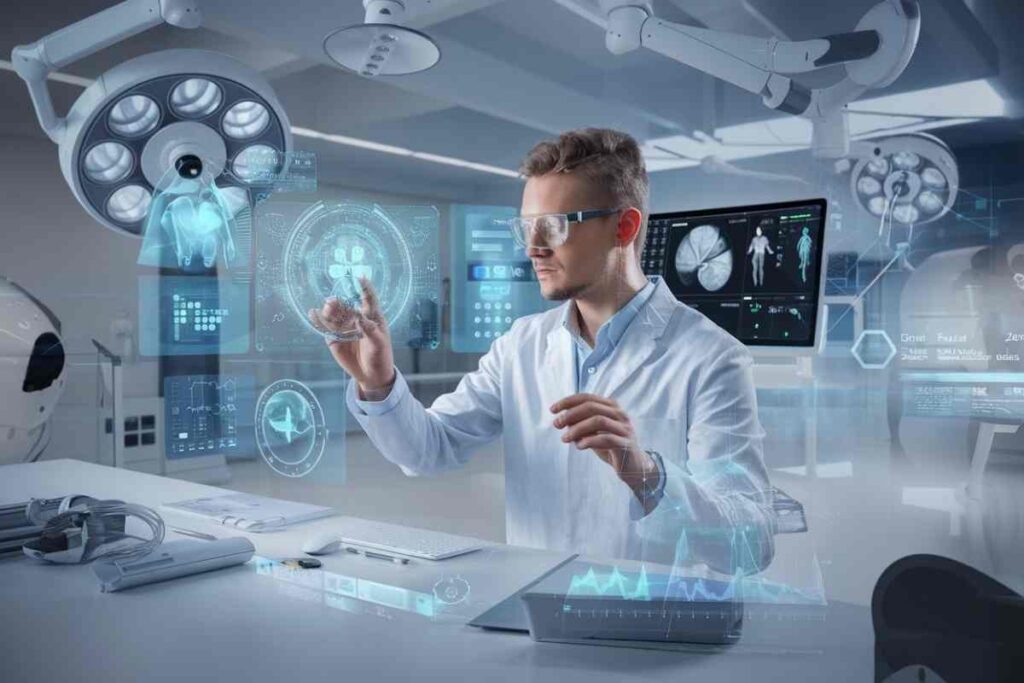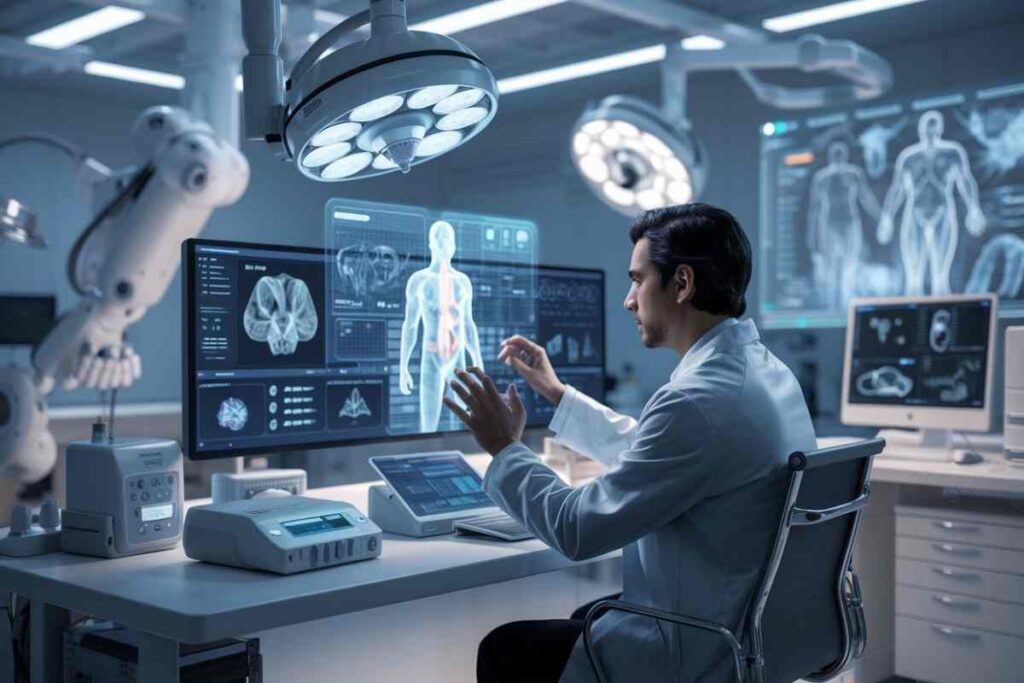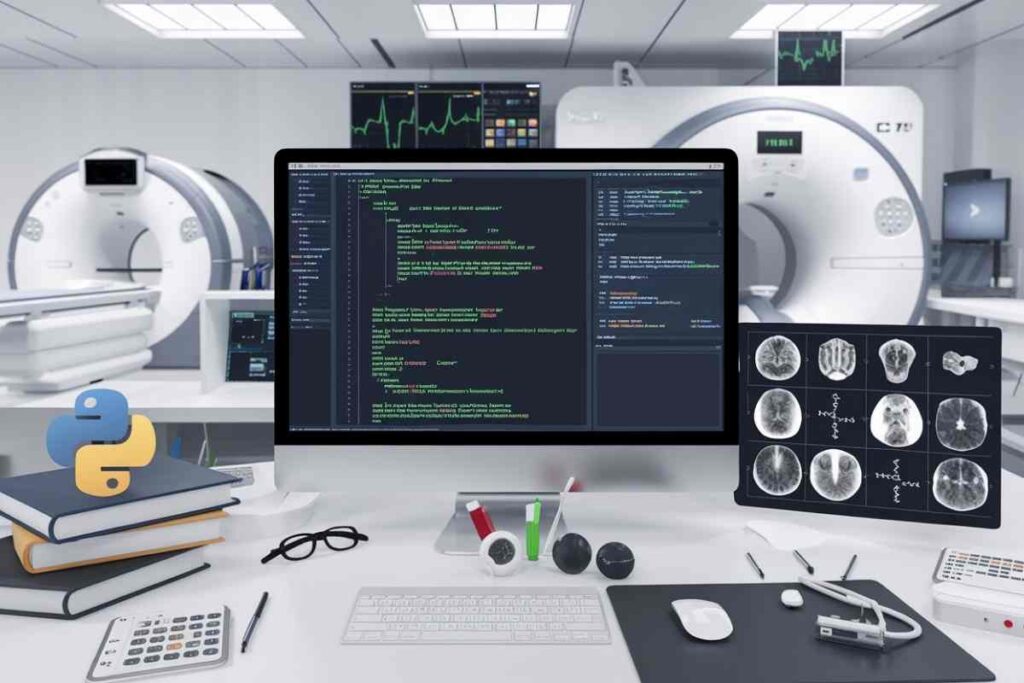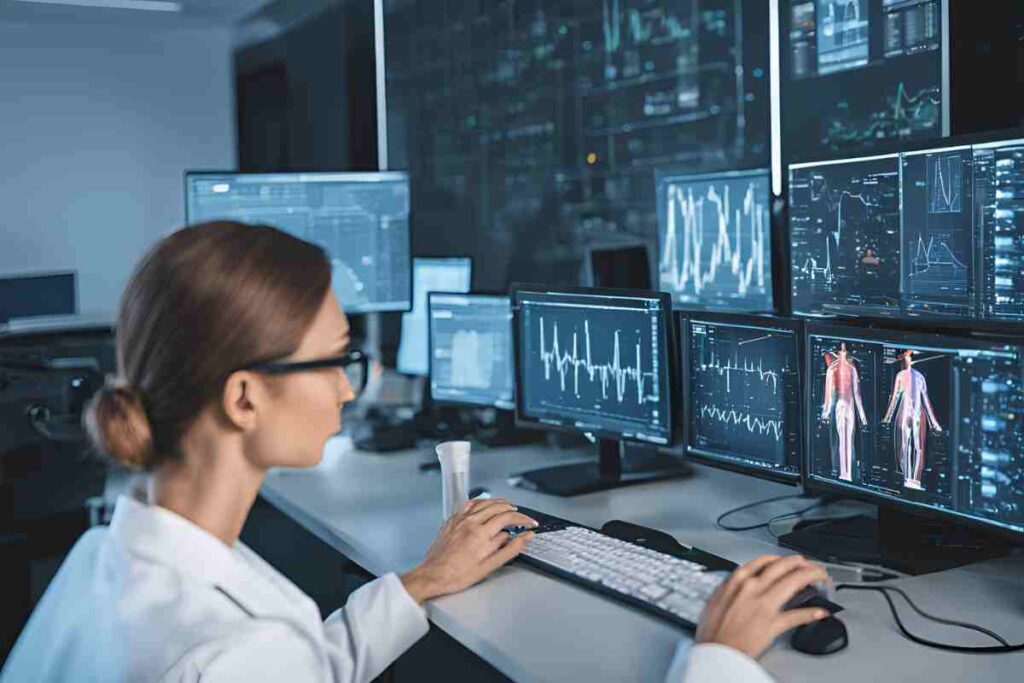Biomedical software developers play a vital role in shaping the future of healthcare through technology. Their work bridges the gap between medicine, biology, and software engineering.
As the demand for technological solutions in healthcare grows, biomedical software developers are increasingly sought after to create software that enhances medical processes, improves patient care, and drives innovation in medical research.
This article will explore what facilities does biomedical software developers work in, the specific environments they encounter, and the diverse opportunities available in this expanding field. For more insights on startup tech and digital growth explore the Rteetech homepage.
What Are Biomedical Software Developers?

Biomedical software developers are specialists who design, build, and maintain software systems used in healthcare settings.
These professionals integrate software engineering with biomedical concepts to create applications for medical imaging, patient management, diagnostics, treatment planning, and more.
Their work ensures the software is user-friendly, secure, and efficient, improving healthcare operations and outcomes.
Common Areas of Work for Biomedical Software Developers

Biomedical software developers can be found in various facilities, each offering unique opportunities to apply their skills.
These settings include hospitals, research institutions, healthcare IT companies, and medical device manufacturers. Below is a closer look at where biomedical software developers typically work:
Hospitals and Healthcare Facilities
Many biomedical software developers work directly in hospitals or healthcare facilities, helping to optimize internal systems and improve patient care. They are responsible for designing software for:
- Electronic Health Records (EHR): Software used to track patient history, treatment plans, and health data.
- Patient Management Systems: Tools for scheduling appointments, managing patient information, and coordinating care.
- Medical Imaging Systems: Software solutions used in imaging modalities like MRI, CT, and X-ray, helping healthcare professionals analyze scans for diagnostics.
- Clinical Decision Support Systems (CDSS): These systems aid healthcare providers in making informed decisions by analyzing patient data and providing recommendations.
- Mobile Health Applications: Developers design apps to monitor and manage patient health remotely, including telemedicine and chronic disease management apps.
Biomedical software developers working in healthcare settings are also involved in ensuring that software complies with healthcare regulations such as HIPAA (Health Insurance Portability and Accountability Act) in the U.S. and GDPR (General Data Protection Regulation) in Europe.
Research Institutions and Universities
Research institutions, universities, and labs are crucial facilities for biomedical software developers, as they work on innovative solutions for medical research and disease treatment. They develop software for:
- Biomedical Data Analysis: Creating tools for analyzing large datasets, including genomic data, clinical trial results, and epidemiological studies.
- Medical Robotics: Software development for robotic systems used in surgery, rehabilitation, or patient care.
- Simulation Software: Developing simulation tools for testing medical procedures or training healthcare professionals.
- Bioinformatics Tools: Software solutions that analyze biological data, often to identify potential treatments or genetic patterns.
These environments typically offer more flexibility in terms of research and development, allowing developers to experiment with new technologies such as artificial intelligence (AI), machine learning (ML), and virtual reality (VR), which are increasingly important in advancing medical fields.
Medical Device Companies
Medical device manufacturers employ biomedical software developers to integrate advanced software into medical equipment, such as diagnostic tools, patient monitoring devices, and therapeutic devices. In these facilities, developers focus on:
- Medical Imaging Software: Developers design algorithms for medical imaging software, including for MRI and CT machines, to ensure accurate diagnostics.
- Patient Monitoring Systems: Software for real-time patient data collection, analysis, and reporting, often integrated with remote monitoring systems for chronic disease management.
- Surgical Robotics: Software to control robotic surgical systems used in minimally invasive procedures.
- Wearables and Biosensors: Devices that monitor patient vitals or track health data, often paired with mobile applications for analysis and reporting.
The regulatory environment in medical device companies is stringent, requiring software developers to ensure their code complies with FDA regulations for medical device approval.
Healthcare IT Companies and Consulting Firms
Healthcare IT firms specialize in building tailored software solutions for healthcare providers, hospitals, and clinics. These companies require biomedical software developers to:
- Custom Healthcare Software: Develop applications specific to the needs of healthcare institutions, from patient management systems to telemedicine solutions.
- Interoperability Solutions: Biomedical developers create software that ensures different healthcare systems, like EHR, laboratory information systems, and imaging systems, can communicate seamlessly.
- Data Security and Privacy: Given the sensitivity of healthcare data, developers also work on building secure systems that ensure compliance with legal standards and prevent data breaches.
These IT companies, including Citrusbug, often offer a collaborative environment where healthcare software developers, medical experts, and regulatory professionals work together to solve complex challenges and create innovative digital healthcare solutions.
Government Agencies and Non-Profit Organizations
Government bodies and non-profit organizations also provide opportunities for biomedical software developers to contribute to public health initiatives. Developers working in these environments may focus on:
- Public Health Data Systems: Developing software for managing and analyzing public health data, such as tracking disease outbreaks or immunization rates.
- Health Policy and Planning Software: Tools that help in the formulation of health policies or planning healthcare resources based on data analysis.
- Non-profit Health Initiatives: Developing applications for mobile health and disease prevention in underserved regions.
These roles may be more focused on large-scale, societal health problems, offering developers a sense of fulfillment by directly impacting public health outcomes.
Freelance and Remote Work Opportunities
With the increasing reliance on technology and global connectivity, many biomedical software developers now work remotely or as freelancers. These developers may work with a variety of healthcare providers, tech firms, or research teams from around the world. Freelancing provides flexibility, allowing developers to take on diverse projects and expand their professional networks.
Skills and Tools Biomedical Software Developers Use

Biomedical software developers rely on a variety of tools and technologies to perform their roles efficiently. Some of the most commonly used tools and skills include:
| Tool/Technology | Description |
|---|---|
| Programming Languages | C++, Java, Python for coding healthcare applications. |
| Medical Imaging Software | Tools for developing image acquisition and analysis applications (e.g., MRI, CT scans). |
| Data Analysis Tools | MATLAB, R, and Python for statistical analysis and data mining. |
| Database Management | SQL, NoSQL for managing healthcare data. |
| Version Control | Tools like Git for managing source code. |
| Compliance Tools | Software ensuring compliance with FDA, HIPAA, and GDPR regulations. |
Biomedical Engineering jobs
Biomedical engineering jobs span various sectors, including healthcare, research, and manufacturing. Common roles include:
- Biomedical Equipment Technician: Maintenance and repair of medical devices.
- Clinical Engineer: Designing and implementing medical systems in healthcare settings.
- Research Scientist: Developing innovative technologies like prosthetics or imaging systems.
- Regulatory Specialist: Ensuring medical devices comply with safety standards.
- Sales Engineer: Marketing and supporting technical medical products.
Emerging fields such as artificial intelligence in healthcare and wearable technology offer expanding opportunities. Salaries and roles depend on specialization and location.
Biomedical Engineering Salary
The demand for biomedical software developers is growing rapidly, with healthcare organizations increasingly adopting advanced technologies.
According to the U.S. Bureau of Labor Statistics, the median annual salary for software developers in healthcare applications was around approximately $100,730 in 2023, and the field is expected to grow at a faster-than-average rate.
Job outlook for this field is also promising, with an expected growth rate of 7% from 2023 to 2033, which is faster than average for most occupations.
Conclusion
Biomedical software developers work in diverse facilities, each offering unique opportunities to contribute to the advancement of healthcare technology.
From hospitals and research institutions to medical device companies and healthcare IT firms, the scope of work is wide-ranging, and the demand for skilled developers continues to rise. As the healthcare industry becomes more reliant on technology, these professionals will play an essential role in shaping the future of patient care, medical research, and healthcare operations.
By understanding where biomedical software developers work and the skills required, aspiring professionals can find the right facility to match their interests and career goals.
Whether working in a hospital, research lab, or as a freelancer, biomedical software development offers a rewarding career path with the potential for significant impact on healthcare outcomes. learn more about our SEO for business growth strategies instead of just “Rteetech LCC”.
FAQS
What facilities does biomedical software developers work in?
Biomedical software developers work in diverse environments such as healthcare organizations, hospitals, medical device companies, tech firms, research labs, and academic institutions.
What are the main responsibilities of a biomedical software developer?
Their responsibilities include developing and maintaining software for medical imaging, patient data management, medical diagnostics, and integrating systems within healthcare facilities.
Do biomedical software developers need a special degree?
Yes, most biomedical software developers have a degree in computer science, software engineering, or biomedical engineering, with additional knowledge of biology and medical technology.
What programming languages are essential for biomedical software developers?
Common languages include C++, Java, Python, and R, as well as tools like MATLAB for data analysis and machine learning applications in healthcare.
How can I start a career as a biomedical software developer?
Start by obtaining a bachelor’s degree in computer science or a related field, followed by gaining experience through internships and working on biomedical software projects.
What industries hire biomedical software developers?
Biomedical software developers are hired in industries like healthcare, medical device manufacturing, biotechnology, pharmaceutical companies, and academic research institutions.
Is the demand for biomedical software developers growing?
Yes, the demand is increasing due to the growing need for software in medical research, diagnostics, and healthcare technologies. The Bureau of Labor Statistics predicts strong job growth.
What are some tools used by biomedical software developers?
Common tools include Git for version control, SQL for database management, MATLAB for data analysis, and platforms like Docker for application deployment in medical environments.
These FAQs target common questions related to the field and are designed to improve your article’s SEO while providing helpful, succinct answers.



